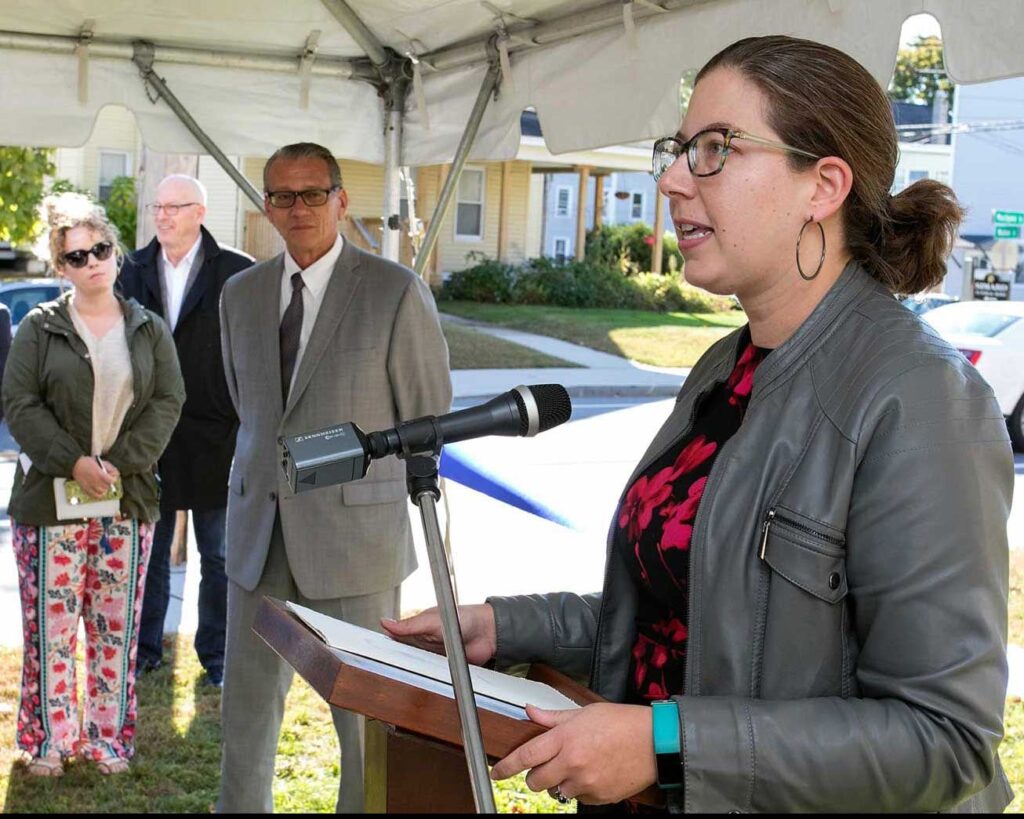where she lives on the same street she grew up, in a home once owned by her great-grandparents. Her parents and brother live in adjacent homes. A 2006 graduate of Leominster High School, Natalie proudly serves as a State Representative for the 4th Worcester District (Leominster).
A fierce defender of the working class, survivors of sexual violence, and all those looking to pursue a debt-free education, Natalie is driven by her conviction that government should provide a safety net for all its citizens. She is loyal and dogged in her determination to fight for her constituents and those who may not have a voice in government.
Growing up, Natalie’s parents were dedicated to ensuring she and her brother were given every opportunity, including being the first generation to attend college. “My dad has a ninth-grade education and is a small business owner. He worked his way up from pumping gas to a mechanic, to working as an auto parts store delivery driver, then as a manager, and eventually bought the store from his old boss. His is the success story we hope we can all achieve in the United States. My parents worked hard to ensure my brother and I had more opportunities than they did and that we knew college was an option for us.”
As a high school senior at Leominster High studying AP Government, Natalie met State Rep. Jennifer Flanagan. This encounter would inspire Natalie to pursue a degree in political science at UMass Amherst. “I was participating in this afterschool program called STAMP, Students Taking Action in Massachusetts Politics. For me, it was great to see this young, elected woman who had one foot in her community and one foot in state government. I wanted to learn how to make government work better. I’ve always believed that government should provide a basic social safety net. And so, I pursued a degree in political science, and my first internship was in the office of Jennifer Flanagan!”
While getting accepted into college was not a challenge for the honor student, figuring out how to pay for it was. “We had no idea how much college was actually going to cost. It was a hard reality check.”
This reality check stayed with Natalie and continued to be a driving force in her professional and political career.
As a student at UMass, Natalie participated in the Citizen’s Scholar Program (now known as the Community Scholars Program), a two-year academic, civic engagement, and leadership program where students work with community organizations throughout Western Massachusetts. For her CSP program, Natalie completed 80 hours of training as a rape crisis counselor at the Center for Women and Community in Amherst, MA, where she saw first-hand how the legislative process worked.
“In 2009, the year I graduated from UMass, Massachusetts still didn’t have the 258 E Harassment Prevention Order in place, meaning survivors of sexual violence couldn’t get a restraining order. That was a huge gap in the law. I participated in an organizing campaign for the Center for Women and Community. I did outreach to state legislators. Sexual violence advocates had been working on this legislation for a decade. I got to come in at the end and watch the bill go through.”
After graduating from UMass, Natalie was hired as a teen counselor at Pathways for Change, a rape crisis program in Worcester County, serving 47 cities and towns. Natalie worked with a caseload of 15 teen survivors of sexual violence. She also conducted workshops on sexual violence prevention, education, and consent, and what it means to be in a healthy relationship for middle and high school students.
“Working with my teen survivors reaffirmed my desire to go to law school. The legal system was not a place where they were getting any closure or a place to heal. A two-year case dragged on way too long for a fifteen-year-old. A lot of my teens just wanted it to stop. I applied to law school and got into Northeastern University. I wanted to figure out how to make these laws work better for our community. How do we make sure that they truly protect women?”
Natalie learned about the Rappaport Center for Law and Public Policy Fellowship as a first-year law student and was immediately interested. “As a working-class graduate student, finding out there was a paid opportunity to do public service work was intriguing. I wanted my Fellowship to focus on sexual violence. I remember the person who oversaw the program at Northeastern said, ‘I don’t know that they’ve ever funded a pitch like this before. I was accepted and placed in Governor Deval Patrick’s office with the Governor’s Council to Address Sexual and Domestic Violence.”
“My Fellowship took place around the time of the Jerry Sandusky scandal. We realized there’s a lot of liability and exposure for minors on college campuses. The Council wanted to address how to protect these minors and everyone who comes on the grounds of our public university campuses. My supervisors were from the Office of Cabinet Affairs. I got to see the Governor and Lieutenant Governor in action; I regularly attended the Governor’s Council, so I got to see, behind the scenes, just how difficult some of these laws can be to implement.”
Natalie’s Rappaport Fellowship provided her with access to Massachusetts state government in a way she had never dreamed possible. She attended cabinet meetings and legislative sessions and networked with a wide variety of elected officials. “The sessions with different state leaders helped break down the different parts of government for me. As someone who hadn’t had access to government in ways many other folks do. It made me feel welcome. This was a world where I could exist and work. I’m incredibly grateful for the opportunity the Rappaport Foundation gave me in law school. It’s a formative part of my time in college and helped me on my path to being a state representative.”
Upon graduation from Northeastern, Natalie was named Executive Director of the Public Higher Education Network of Massachusetts (PHENOM). A nonprofit advocating for high-quality, debt-free public education. “The Massachusetts Public Higher Education system has 29 campuses across the state. PHENOM brings students, staff, faculty, and administrations together to speak with one voice. It was a great experience from a community-organizing lens.”
For Natalie, working for PHENOM was a labor of love.
“I was born in 1988, the year that state funding for public higher education started to get cut in Massachusetts. Over time, we cut investments in public higher education institutions by a third and financial aid by a third. We’ve ended up with a system where it’s entirely normal for someone to go to a four-year public university and take out $35,000 in loans. A generation before that wasn’t the reality. We want the same opportunities our parents’ generation had. More than half of Massachusetts residents have a bachelor’s degree. In my community, it’s less than a third. In most gateway cities, it’s less than a quarter. By making college affordable, we can level the playing field and create an economy that works for everyone. “





